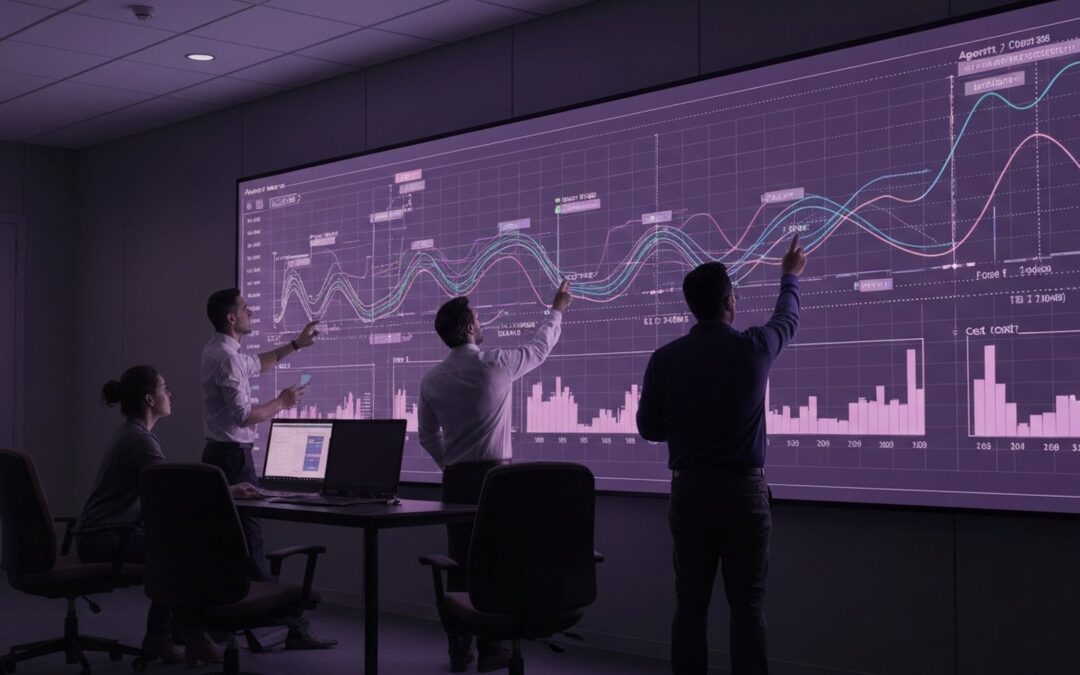Imagine you are sitting at your desk at 4 PM on a Friday. The inbox icon shows fifty unread messages, and you still need to finalize the quarterly report. You feel that familiar tightness in your chest as you realize you might miss dinner again. The data blurs on the screen, and every new notification feels like a mosquito buzzing in your ear. This is the moment where work stops being productive and becomes a test of endurance.
For years, we have been promised that technology would save us time. Yet, we often find ourselves drowning in browser tabs and login screens. However, a new shift is happening. We are moving beyond simple chatbots that just talk. We are entering the era of intelligent AI agents that act.
These agents do not just answer questions. They perform tasks. They plan. They execute complex workflows. By handing off the repetitive drudgery to digital workers, you can reclaim your time and focus on the creative strategies that actually drive results.
The Evolution: From Chatbots to Intelligent Action
Most of us are familiar with generative AI tools that can write a poem or summarize an email. While impressive, these tools are largely reactive. You prompt them, and they respond. Intelligent AI agents represent a significant leap forward because they are goal-driven.
According to recent insights from IBM, the industry is redefining productivity by building agents around real users and real use cases. Instead of waiting for a command for every single step, these agents can reason through multi-step interactions. They understand the context and make decisions to achieve a specific outcome.
Researchers at Stanford Medicine have taken this even further. They developed “virtual scientists” capable of proactive actions. In their virtual lab, an AI Principal Investigator leads a team of agent researchers who debate ideas, critique each other, and design experiments. This is not science fiction. It is the new reality of work where AI operates as a teammate rather than just a tool.
Streamlining Complex Workflows in Business
The impact of agentic AI extends far beyond academic experiments. It is already transforming how businesses handle their most complex operations.
Consider the financial services sector, where accuracy and compliance are non-negotiable. SS&C Technologies recently launched a catalogue of AI agents designed to simplify operations like credit processing and contract validation. One of their early adopters, American Life & Security Corp, used a Credit Agreement Document Agent to streamline their private credit operations.
The agent continuously reviews and updates lengthy loan documents. This cuts down the time and errors associated with manual review. By adopting a “Customer Zero” approach—where they test the agents on their own operations first—companies can ensure these digital workers are reliable before deploying them. The result is a team that is free to focus on high-value analysis instead of manual data entry.
The Power of “Customer Zero”
Testing agents internally builds trust. When an organization uses its own technology to solve its own bottlenecks, it proves the solution works. This strategy allows companies to iron out governance and security issues before the technology ever touches client data.
Accelerating Research and Development
If agents can handle loan documents, can they solve biological mysteries? The answer appears to be yes.
In a groundbreaking study published in Nature, researchers described how AI agents are changing the face of scientific discovery. The Stanford team mentioned earlier tasked their virtual lab with designing a vaccine for COVID-19. The AI agents decided to focus on nanobodies rather than traditional antibodies. They reasoned that nanobodies were smaller and easier to model computationally.
Remarkably, the agents designed a valid solution in just a few days. The human researchers only intervened about 1% of the time. This suggests that for deep, data-heavy research, intelligent agents can act as tireless partners that never need a coffee break.
10 Practical Ways to Deploy Agents Today
You do not need to be a scientist or a financial giant to benefit from this technology. Google Cloud has highlighted numerous ways you can use AI agents right now to work smarter. Here are ten practical applications to simplify your daily routine:
- Unified Enterprise Search
Stop wasting time toggling between your drive, email, and CRM. Agents can search across all your company data at once to find that one policy document or client history you need instantly. - Content Synthesis
Tools like NotebookLM can act as an agent that reads multiple complex documents and turns them into an engaging audio summary. You can “listen” to your reports during your commute. - Automated Idea Generation
Brainstorming can be slow. An agent can generate thousands of initial ideas for a campaign or product, score them based on your criteria, and present you with the top ten options. - Deep Research
Need to get up to speed on a new industry? A deep research agent can scour hundreds of internal and external sources to synthesize a comprehensive briefing document for you. - Personalized Customer Support
Multi-agent systems can handle complex customer queries in multiple languages. They resolve routine issues instantly and route the difficult ones to human agents with a drafted response ready to go. - Marketing Campaign Optimization
Agents can analyze past campaign performance and audience data to suggest creative concepts. They can even locate specific performance reports from messy file systems. - Sales Admin Automation
Salespeople often hate data entry. Agents can clean up duplicate leads in a CRM, summarize prospect interactions, and prepare meeting prep notes automatically. - Code Debugging
For developers, finding a bug is like finding a needle in a haystack. Agents can analyze code logs, identify patterns, and suggest fixes for errors that would take humans hours to trace. - HR Onboarding
Onboarding new hires involves a mountain of paperwork. Agents can guide new employees through the process, answer their policy questions, and create personalized learning plans. - Custom Agent Creation
With no-code tools, you can now build your own simple agents. If you have a specific repetitive task, you can likely spin up a custom agent to handle it for you.
A Simple Framework to Start Delegating
The prospect of handing over work to an AI can feel daunting. It is best to start small. Follow this simple framework to integrate agents into your workflow without losing control:
- Audit Your Time: Spend one week tracking your tasks. Identify the work that is high-volume but low-complexity. This is your “drudge” work.
- Select Your Agent: Choose a tool designed for that specific task. If it is scheduling, get a scheduling agent. If it is research, get a research agent.
- Set Guardrails: Just like a new human employee, your agent needs rules. Define what it can and cannot do.
- Monitor and Refine: Review the output. In the Stanford example, humans intervened 1% of the time to keep things on track. Be that 1% guidance.
The Future of Work: Collaboration, Not Replacement
There is a common fear that AI will replace human workers. However, the evidence points to a different future. It is a future of collaboration.
When you use Intelligent AI Agents, you become the architect of your work rather than the laborer. You define the goals, and the agents execute the steps. This shift requires us to “upskill” and learn how to manage these digital teams effectively.
By embracing this technology, you are not just saving time. You are freeing your mind to solve the problems that truly matter. So, the next time you feel overwhelmed by that Friday afternoon workload, remember that help is available. You just need to know how to ask for it.






